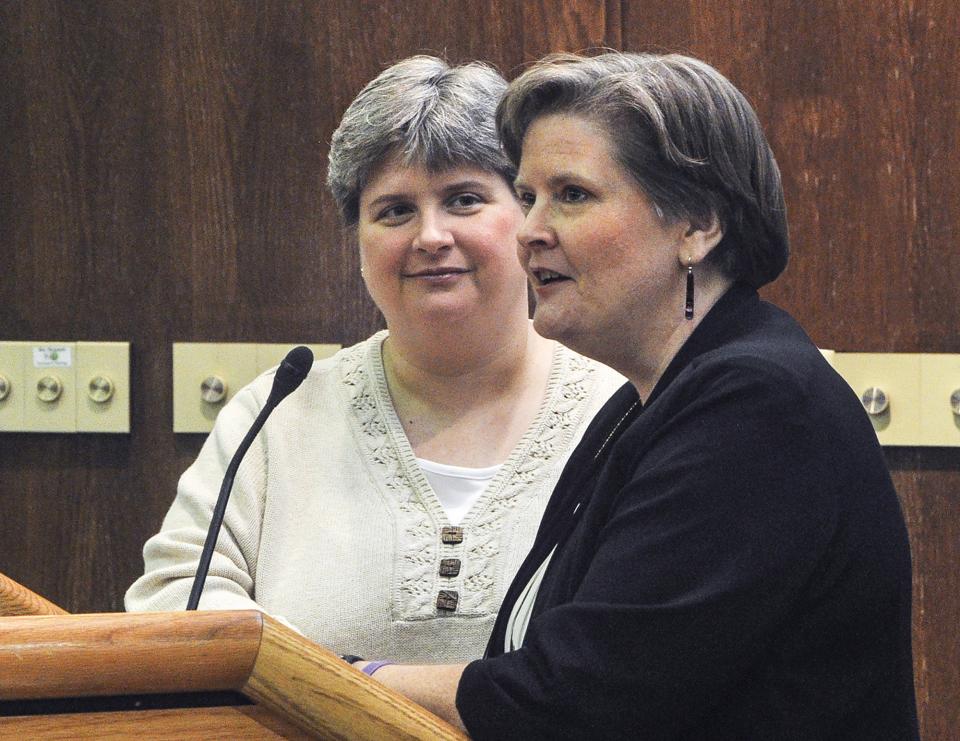 TULSA, Okla. (AP) — For the second time in a month, a federal judge has set aside a deeply conservative state's limits on same-sex marriage, this time in Oklahoma.
TULSA, Okla. (AP) — For the second time in a month, a federal judge has set aside a deeply conservative state's limits on same-sex marriage, this time in Oklahoma.
Like the federal judge who reversed Utah's gay marriage ban in December, Kern determined that Oklahoma's constitutional amendment violated the U.S. Constitution's equal protection clause. His ruling was littered with references to both the Utah ruling and those issued by the U.S. Supreme Court last summer.U.S. District Judge Terence Kern on Tuesday struck down Oklahoma's voter-approved ban, but headed off any rush to the altar by putting the effects of his ruling on hold while state and local officials complete an appeal.
Kern described Oklahoma's ban on same-sex marriage as "an arbitrary, irrational exclusion of just one class of Oklahoma citizens from a governmental benefit."
"Equal protection is at the very heart of our legal system and central to our consent to be governed," Kern wrote. "It is not a scarce commodity to be meted out begrudgingly or in short portions. Therefore, the majority view in Oklahoma must give way to individual constitutional rights."
The decision drew criticism from the governor, attorney general and other elected officials in this state, known as the buckle of the Bible Belt. A state lawmaker who once said gay people posed a greater threat to the nation than terrorism blasted rulings from "activist judges."
Oklahoma's ban on same-sex marriage is the third to be struck down by a federal judge, after California and Utah. State courts also ruled in favor of same-sex marriage in New Mexico in December and New Jersey in October.
Camilla Taylor, marriage project director at civil-rights organization Lambda Legal, said momentum has been increasing as litigators see that gay-rights groups are winning same-sex marriage cases. She said there are currently 43 gay marriage lawsuits in courts, and a new one is brought almost every week.
The Oklahoma ruling came in a lawsuit filed nearly a decade ago, by two same-sex couples.
"There's so much emotion, I'm kind of crying right now," said Mary Bishop, who hopes to marry partner Sharon Baldwin. "It's overwhelming to think that we finally won.
"Sharon and I want to get married here in Oklahoma. We've been together for more than 17 years — it's time. This is something that when I was young, I thought I'd never see in my lifetime."
Bishop and Baldwin, who work at the Tulsa World newspaper, filed the lawsuit with another same-sex couple in November 2004, shortly after voters approved the constitutional amendment. Their case was the longest-running challenge to the Defense of Marriage Act, according to the national gay marriage advocacy group Freedom to Marry.
"The Bishop couple has been in a loving, committed relationships for many years," Kern wrote. "They own property together, wish to retire together, wish to make medical decisions for one another, and wish to be recognized as a married couple with all its attendant rights and responsibilities."
Taylor, with Lambda Legal, said she wasn't sure why the judge's ruling came now, though she noted that he made several references to the Utah case in his ruling.
In his 68-page ruling, Kern also took a shot at Oklahoma's high divorce rate, noting that "excluding same-sex couples from marriage has done little to keep Oklahoma families together thus far."
"Exclusion of just one class of citizens from receiving a marriage license based upon the perceived 'threat' they pose to the marital institution is, at bottom, an arbitrary exclusion based upon the majority's disapproval of the defined class," Kern wrote. "It is also insulting to same-sex couples, who are human beings capable of forming loving, committed, enduring relationships."
Republican Gov. Mary Fallin issued a written statement accusing Kern of undermining the will of Oklahoma voters who overwhelmingly passed the ban.
"I support the right of Oklahoma's voters to govern themselves on this and other policy matters. I am disappointed in the judge's ruling and troubled that the will of the people has once again been ignored by the federal government," the statement said.
Attorney General Scott Pruitt said the Supreme Court had left it to the states to define marriage and that Kern's ruling was "troubling." He said it would likely take another Supreme Court decision to resolve the matter.
Tulsa County Court Clerk Sally Howe Smith, who was a defendant in the lawsuit, said there was no way under Oklahoma law for her to give Baldwin and Bishop a marriage license. "That's how I became a defendant in the case," she said.
Not including Utah and Oklahoma, 27 states still have constitutional prohibitions on same-sex marriage. Four more — Indiana, Pennsylvania, West Virginia and Wyoming — do not permit it through state laws.
For 17 days, Utah was the 18th state to allow gay couples to wed, after a federal judge there overturned the state's same-sex marriage ban. Hundreds of couples got married before the Supreme Court put a halt to the weddings earlier this month by granting the state a stay on a federal judge's ruling that two other courts previously denied.
The fate of gay marriage in Utah now rests in the hands of the 10th Circuit Court of Appeals in Denver — the same circuit as Oklahoma.

No comments:
Post a Comment